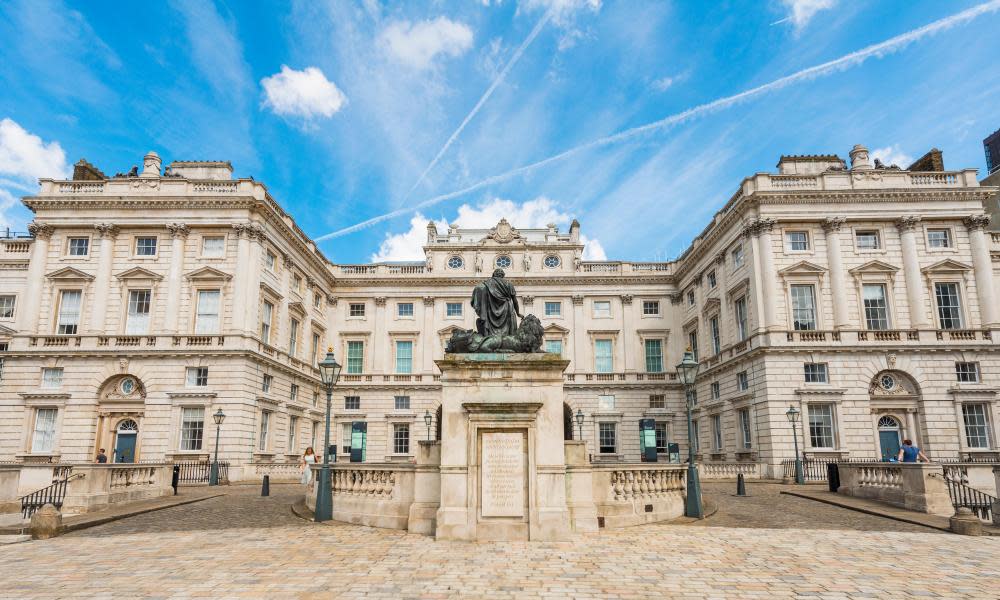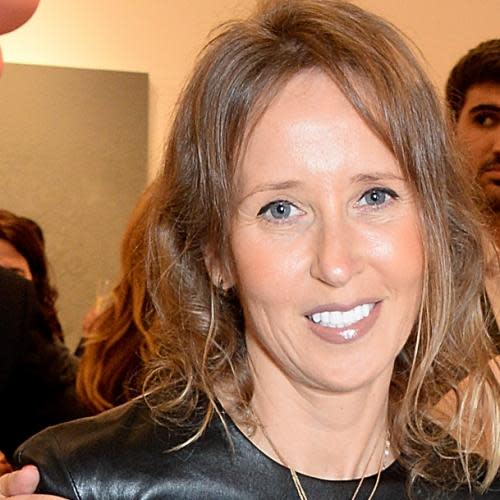Somerset House donor married to oligarch quits board

Exclusive: Maria Adonyeva, who gave arts centre at least £380,000, also steps down as Tate patron
The wife of a Russian businessman who at one stage pleaded guilty to defrauding the Kazakh government out of $4m (£3m) has stepped down as a patron of the Tate and from a prestigious advisory board at Somerset House, where she was a major donor.
Maria Adonyeva, who has a London-based charitable foundation and has been pictured as recently as 2018 on her husband’s yacht with close friends, including the actor Melanie Griffith, has given at least £380,000 in the past two years to Somerset House, where she sat on the arts centre’s development advisory board.
Her husband is Sergey Adonyev, a Russian telecoms multimillionaire whose Bulgarian citizenship – which he had acquired in return for a promise of investment – was revoked in 2019 over the fraud conviction in the US. In September he was successful in having that guilty plea and conviction overturned.
Somerset House said Adonyeva had stepped down from its trust’s development advisory board after consultations on Tuesday.
The Tate also said this week that she had stepped back as a platinum donor, a scheme that provides the highest level of patron engagement, with premier access to directors and curators, high-profile artists, leading collectors and art specialists.
Somerset House said it had known Adonyeva since 2018 but had never had dealings with her husband. It conducted due diligence before receiving any donation from the Adonyeva Foundation, it said.

It added: “Based on the information we had at the time, trustees felt able to accept financial support from the foundation to support Somerset House’s residencies and cultural programme. We have no contractual agreement for any further support.”
Tate also said it never had any contact with Sergey Adonyev.
The couple have been separated since 2016 .
In 1998, Adonyev was convicted in the US of defrauding the Kazakh government of $4m through false sales of Cuban sugar. He was sentenced to 30 months in jail, much of which he had already served, before he was, in effect, deported to Russia the following year.
Ranked by the Russian edition of Forbes magazine as Russia’s 114th richest man in 2020, he is the former co-owner of the Russian telecoms operator Yota and has had ties to Sergei Chemezov, the head of the Russian state defence corporation Rostec and a former KGB general close to Vladimir Putin. A smiling Putin was pictured watching as Chemezov and Adonyev sign an agreement paving the way for Adonyev’s company to make inroads into an already mature telecoms market.
Chemezov is facing sanctions in the UK and EU, where Spanish authorities seized his yacht on Tuesday.
Adonyeva describes herself as a businesswoman, philanthropist and art collector. Her Adonyeva Foundation, a charity, names her as the chair and her Eton-educated son as a trustee. It donated £699,000 to charity in the year to September 2020 and on its website lauds its support for Somerset House, saying it allowed the art centre to engage in “an ambitious commissioning programme”, including the exhibitions Get Up, Stand Up, Now and 24/7. The website appears to have removed most of its content this week.
Sergey Adonyev is not subject to sanctions.
The affair at Somerset House comes after controversies at other arts institutions in the wake of the Russian invasion of Ukraine and the focus on wealthy Russian-linked donors.
Transparency International said: “Prestigious British institutions should be aware that the legitimacy they give to their patrons is much sought after by those with reputations to burnish. While galleries and cultural centres are not regulated for money-laundering purposes, they should be really careful about where they’re taking their big donations from.
“The last thing the arts wants to do right now is be associated unwittingly with those close to the Putin regime. These institutions can protect their integrity by making a positive statement and publicly refusing support from individuals with dubious pasts and associations.”


